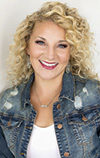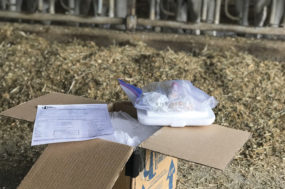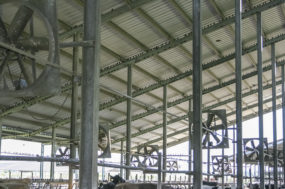Coyne openly shared his experience via social media, documenting his symptoms, test results, self-quarantine and return back to trimming. He tells Progressive Dairy how he believes he contracted coronavirus, the impact it has had on him and his family, and why he thinks those working in the dairy industry are still at risk.
 William (Willie) Coyne
William (Willie) Coyne
Hoof trimmer
On the Money Hoof Care
Describe how you believe you contracted coronavirus.
COYNE: I was working on a dairy in a cross-ventilated barn on Friday, May 22. I had two other trimmers with me who were brothers. At the end of the day, the herdsman who was bringing us cows said he wasn’t feeling well. None of us thought anything of it. The closest we were to him throughout the day was at the end of the day, maybe 4 to 6 feet away.
Five days later, I woke up with a minor headache; by Wednesday, I had a high fever. One of the brothers I had worked with got sick on Tuesday, the other on Wednesday. When I reached out to the farms I worked with to be proactive and let them know I had woken up sick, the farm I had been at the previous Friday mentioned the herdsman had a positive test. I believe that’s where it came from, as none of the three of us interacted with anyone else with a positive test. My theory after talking to the department of health was that he worked downwind from us all day sorting cows, and the fans brought everything right down to us where we were trimming.
What symptoms did you have, and how was your case confirmed?
COYNE: The first symptom I experienced was a headache, then the high fever (104ºF) with chills and sweating. I only coughed a handful of times. After taking my temperature that Wednesday morning, that’s when we realized it was pretty serious. I immediately called the ER for recommendations. Tylenol helped to control the fever.
When I notified my 18-month-old son’s daycare that I was sick, they requested I be tested for COVID-19. I was tested and had a positive test result confirmed a few days later. Our daycare closed down for a two-week period following that.
The brothers I had worked with experienced similar symptoms. They did not get tested. They were just told to assume they were positive because they were exposed to someone else with a confirmed positive.
The scary thing is that we were exposed before we even knew. That’s what we took for granted. The two brothers went to their church, and multiple people in their parish got sick. They had no clue they were spreading it.
What steps did you take to protect your family’s health?
COYNE: Once I had been tested, I started wearing a mask at the house and segregated myself in my bedroom for the next seven days. I did go outside, but any time I used our bathroom, I sterilized all surfaces (sink, door handles, etc.).
Everyone in my house quarantined as well, including my son and wife, along with my sister and her boyfriend who had been visiting. Their quarantine was supposed to be over June 10, but then my wife received a positive test and the isolation period restarted for our household for another 14 days. Neither my son, sister or her boyfriend got sick.
How would you sum up the quarantine experience?
COYNE: For me, personally, the mental and emotional toll it took was more than we anticipated, with the hardest part being that I couldn’t see or touch my son for his own health and safety, even while we were in the same house. When your son stands outside your door calling “Daddy” and you have to ignore him, that was the hardest thing. He won’t remember, but I will.
What’s it like to be back trimming?
COYNE: I started back to work 10 days after the test. The worst part was the fatigue. All the farms were aware I had tested positive for COVID. I’m putting faith in the doctors and epidemiologists who say if you’ve been infected, you are no longer at risk to be a carrier or spreader. If I go into a store, I do wear a mask. On farms, I’m not.
Also, I’m more stringent on making sure people maintain distance. I just give my reports to the herdsman in the barn and try to stay out of the office as much as I can.
On the flip side, just like everyone, I’m anxious to get back to a more normal, but I have a lot of cautious optimism and am more aware of what it means to people to get it. We need to take it more seriously. It’s not about us. It’s about every single person we may or may not have come in contact with.
Based on your personal experience, how do you believe dairy owners and managers can protect themselves, their employees and their vendors from coronavirus?
COYNE: Employees are one of the most valuable assets on any dairy farm. Make sure they understand the risks so they can make good decisions. Some may not understand English to receive information through the news on how to reduce the risk of contracting or spreading. This is especially important in communal living situations.
It’s also important for employees to know if they are sick – even if they just feel like they have a cold – they should let their employer know and communicate a plan. If one employee has to stay home for two weeks, that’s better than five employees having to stay home for two weeks. Also, it is possible we are putting pressure on employees to come to work when they are ill, even when we don’t do it intentionally.
I believe many vendors understand the risks. I knew there [were] risks, but I felt it was more important for me to take care of the cows and help them get better, and to support my family. I think a lot of other people – employees, vendors – can relate to that.
There are many ways we can protect each other, but we need to be open and talk about it. If someone on the farm has a positive test, communicate that. If people are coming onto our farms, we have the responsibility to keep them safe. It’s the people you work with all the time. Vendors [who] come to farm regularly. Think of us. Think of our families. Think of our employees, and think of the people who interact with them on a daily basis who don’t speak up.
What’s been your personal takeaway from your COVID-19 experience?
COYNE: What really stands out about this virus is that it does not matter where it came from or how it started. It doesn’t matter what our political beliefs are. The reality is: It’s here and, at the current time, it’s not going anywhere. Even if things are trending down, there are still going to be more cases.
I think back about the day we spent working in a barn with a person who later had a confirmed COVID-19 test. If he would have said he was not feeling well and stayed home, what’s the worst that would have happened that day?
My point: Hoof trimming could have waited. Had that employee stayed home and not come to work, it would have reduced his risk of exposing us and the other people [who] work on the farm. I would ask that ownership and management be cognizant that their management choices and decisions could affect people they never would have dreamed or thought. ![]()

-
Peggy Coffeen
- Editor
- Progressive Dairy
- Email Peggy Coffeen







